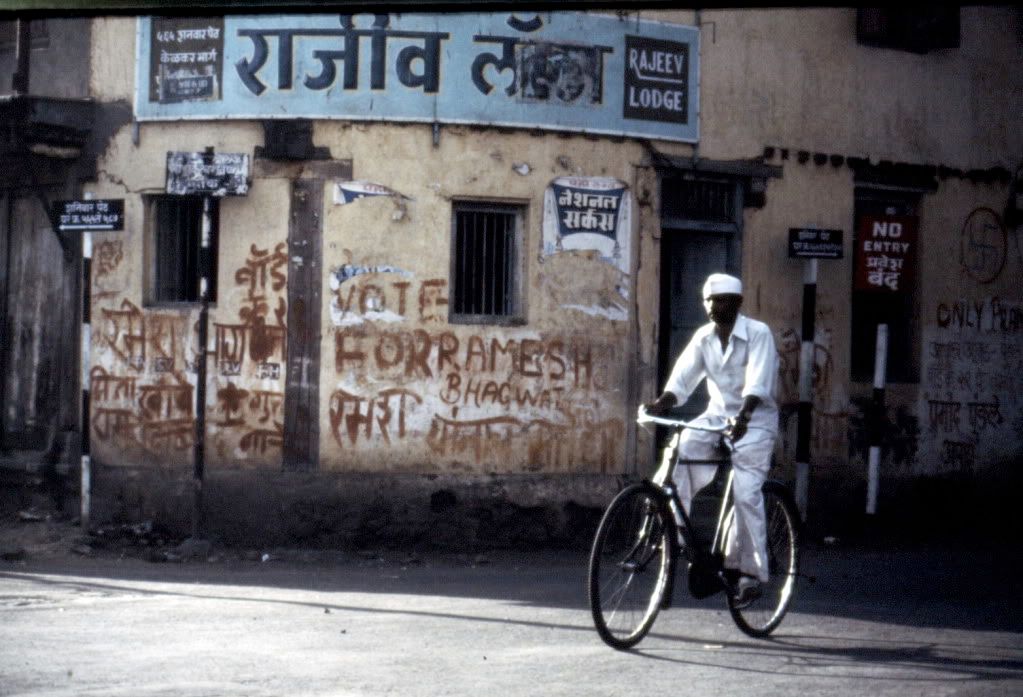atheism Education: AUM cluelessness fundamentalist encounters
by Warren
leave a comment
Meta
SiteMeter
Brighter Planet
Sometimes they do it to themselves.
Years ago I got a student referral from a colleague. J_____ called me and wanted to begin studying Indian music. I explained the scheduling and fee structure to him, and he seemed anxious to begin.
“But,” he then said, anxiously, “you’re not going to make me meditate or anything, are you?”
I assured him that I would be teaching music, not meditation.
He came and started lessons. As part of developing his voice production, I instructed him to sing the tonic Sa while moving his lips from a wide “AAAAAAA” slowly through all the intermediate vowel positions, listening to the sweep of the overtones as his lips moved from “OOOOOO” to “UUUUUUU” and finally closed on an “MMMMMMMM.” He enjoyed that and commented repeatedly how it seemed to help his singing voice gain resonance (true, dat).
J_____ was a pretty musical guy, and he started to make progress with the first raga we selected. He struck me as someone who craved the “exotic” quality of augmented seconds, so I started him on Raga Bhairav — always effective as an auditory icon of India. He learned some alap phrases and grasped basic sargams pretty rapidly; I taught him some rhythmic variations on a sargam composition and he internalized them quite well.
I said, “It seems to me you’re ready for a song, J______.” He replied, “Well, okay, but it can’t be anything Hindu.”
I said, “What?” He repeated himself, and asked, “Is the song you want to teach me a Hindu song?”
I replied, “Well, many of the songs of this tradition reflect Hindu themes in their lyrics. It’s kind of unavoidable. Why is it important to you to avoid a song with a Hindu theme?”
His answer? “Because Hinduism is an evil religion.”
Uh-huh. I asked him how he knew this, and he replied that the minister at his church told him so. Which is how I discovered that the guy who was taking raga lessons from me was in fact a hard-core fundamentalist nut-job. His minister had delivered a whole string of sermons on the eeeeeevil Hindus and their terrible idolatry and caste system and cow-worshiping and eight-armed gods and on and on and on. And J______ had swallowed the whole thing, hook, line and sinker.
Which was why he had wanted to be sure I wasn’t going to teach him meditation.
So we had a little conversation, and I suggested that maybe all religious traditions had some stuff in their closets they perhaps shouldn’t be too proud of, like the Inquisition. He was taken aback, and said, “Aren’t you a Christian?”
“No,” I said. “I’m an atheist.”
He left, rapidly. Three days later I got a call from him.
“Warren, this is J_____. I’m not going to be able to keep taking lessons from you, because, um, because, aaah, er, um, I…, I…., ummm, I, er, um…don’t have enough money to continue. But I want you to know that I’ve really enjoyed the lessons, and I’m going to continue to do the overtone exercise every day the way you showed me, because it seems to be really good for my voice.”
Which is how I got a gen-you-wine bible-thumpin’ intolerant ignorant fundie whackjob to spend a bit of time every day…saying “AAAAAOOOOOOOOUUUUUUMMMMM” over and over.
Bringin’ it all back OM.
environment Politics: idiots New York Times osama bin laden
by Warren
leave a comment
Meta
SiteMeter
Brighter Planet
Day 31: The Gray Lady Redux
There’s been quite a bit of buzz about Osama Bin Laden’s recent statements on global warming. The New York Times wrote something about it…so I took the opportunity to drop a little note in their mailbox.
It is a sad state of affairs when one of the world’s most notorious criminals speaks more accurately about global climate change than many of our own elected representatives. Now it is absolutely certain that climate-change denialists will use Bin Laden’s words to suggest that realistically confronting the largest existential threat humanity has ever faced is somehow un-American, a capitulation to Al-Qaeda. I remember how conservatives responded to Soviet criticism of the USA on civil rights issues in the fifties and sixties: by calling patriots like Martin Luther King “communists,” suggesting their actions were “controlled by Moscow.” The fact that Khrushchev was a murderous thug didn’t stop him from correctly assessing American racial hypocrisy; the fact that Bin Laden is a murderous thug doesn’t mean that his statements on global warming are invalid. It just means that American conservatives are easily swayed by irrelevant ad hominem arguments.
Warren Senders
environment Politics: Citizens United Ed Markey Saudi Arabia
by Warren
1 comment
Meta
SiteMeter
Brighter Planet
Day 29: To Ed Markey
After reading this over at Dkos, I was moved to send a fax to Ed Markey’s offices. Maybe you should do something similar?
Dear Representative Markey,
Muhammed al-Sabban, a senior economic adviser to the Saudi oil ministry (and head of the Saudi delegation to U.N. talks on climate change) recently stated that international agreements to penalize carbon emissions are “one of the biggest threats” to Saudi Arabia’s economy. In light of the Supreme Court’s go-ahead to allow corporations unlimited access to the American electoral process, al-Sabban’s words are especially disturbing. How many nominally American corporations are at least partially owned by individuals or consortia aligned with the Saudi government? And can we have confidence that these companies will use their newly granted powers of monetized “speech” for the betterment of our nation and the global environment? At a time when the world desperately needs meaningful forward motion on climate change issues, the likelihood of OPEC countries interfering in American elections through American-owned shell companies is a virtual guarantee that no progress will take place. Please co-sponsor Rep. Alan Grayson’s “Save Our Democracy” legislative package, and please look into developing further legislation to block the consequences of the extremely damaging and misguided decision by the Bush-appointed majority of the Supreme Court.
Thank you for all you do.
Yours sincerely,
Warren Senders
And y’know, I think I’ll tweak that bit about Grayson’s legislation and send a version of it over to John Kerry as well. A double-header!
India Photoblogging: Pune, 1985-1991
I took a lot of pictures while wandering around Pune in the mid-1980s and early 90s. I was using a Minolta SLR which I still have somewhere in a box; digital cameras have now taken over completely, so I haven’t looked through the lens of my 35mm camera in a very long time. Getting interesting results when you’re photographing scenes on an Indian street is not difficult; Indian streets are inherently interesting. Here are some of my favorites.

Somewhere in City section; I have a vague recollection this was in the vicinity of Appa Balwant Chowk, but that’s probably just my senility kicking in.

Shukrawar Peth, most likely. Probably somewhere close to Phule Market.
more »
Education Indian music music: practice riyaaz
by Warren
4 comments
Meta
SiteMeter
Brighter Planet
More Notes on Practicing
More material taken from my long-ago interview with my student Brian O’Neill. This discusses a practice technique called:
One Lick for Two Hours
Now, when you’re trying to build up speed and technical fluency the following exercise is very useful:
Compose a line (preferably in your head) 2 or 3 notes at a time… and keep building it up until you have something that covers the range that you want to cover and includes whatever kind of technical things you want to address (scalar segments, intervallic jumps, whatever).
Switch the metronome on (at around 60 bpm) and do the line in half notes, keeping the metronome not on the downbeats, but on the upbeats (2 & 4). That is, your sung articulations and the metronome’s strokes aren’t happening at the same time.
Go through the whole line in sargam, in neutral syllables, and in open vowels. If you’re an instrumentalist, go through the line using individual articulations on each note, then with a legato approach.
At which point you double the speed, so that the same line is now sung in quarter-notes, one note per pulse. The metronome needs to stay on the offbeats! Again, do it in sargam, neutral syllables and one or two open vowels.
Then go back to the original tempo and revisit that for a few iterations.
Now move the metronome up a click. If you have a digital metronome, go up by three or four beats per minute.
Repeat the process exactly as before, and when you’re done, move the metronome up another few bpm.
Eventually you’ll get up to mm 120, which is exactly double your starting tempo. Do the same exercise at that tempo…and then shift the metronome back to 60.
Only this time, maintain the same sung/played speed you had at mm 120 — with the metronome at the slower tempo. Now you’ll be singing the line in quarter and eighth notes relative to the speed of the metronome.
Repeat the alternation of “single” and “double” speed, with the metronome still on 2 and 4. (For extra credit, why does this practice work better when the metronome’s on the offbeats?). Keep going up by a few bpm at a time.
Eventually you’ll reach a point where you can go no further; a point where your technique is on the edge of failure.
Don’t stop the practice just yet. Instead, back down by a notch or two, repeat the material, then back down again. Do this eight or nine times, so that when you finally conclude the practice, you’re midway between your maximum speed and mm 60.
Stop.
Go take a walk or something. That’s enough of that practice for the day.
This is not a ten minute practice, this is a two hour practice. Two hours on one lick. The important thing is to keep that process going, all the way up and then retreat, incrementally, back down to about halfway from your original starting point.
This gradual up and down incrementation turns out to be very useful for building a solid technique at all levels of speed. It’s boring as hell, but it works a treat.
I remember sitting down to practice in my apartment in Pune. I was practicing Yaman, I sat down to practice, and I practiced one line for about an hour and forty-five minutes — using this metronome technique. Then I finished, I turned off the sruti box, and immediately my doorbell rang. And I went over and it was Atul, the sitarist in my ensemble. And he said, “That was incredible!” I said, “You were listening to the practice? How long were you there?” He said, laughing, “Oh, I arrived just before you began!” So he had been outside my door for an hour and forty five minutes listening to me go over the same thing and he was completely thrilled to have heard this practice. That was very interesting to me. Not everybody would find that interesting, but Atul did.
environment Politics: investments SEC
by Warren
leave a comment
Meta
SiteMeter
Brighter Planet
Day 28: Same Ol’, Same Ol’
Stimulated by the recently announced decision of the Securities and Exchange Commission that:
Companies must consider the effects of global warming and efforts to curb climate change when disclosing business risks to investors…
I thought I’d dash off a little missive to the Boston Globe saying what an excellent idea I thought it was.
Yesterday the business community got a good dose of realism when the SEC approved new guidelines requiring companies to include information on the impact of climate-change regulation in corporate filings. This is a message that the current administration is more serious about enforcing environmental-protection laws; under Bush, those laws were pretty universally ignored, leaving companies free to pollute. However, climate denialism is still very much a growth sector. Cynical and mendacious people eager to misrepresent an overwhelming scientific consensus are heavily funded by big oil and coal companies. It is time for the business sector to recognize the reality of global climate change and begin marshaling the resources of the private sector to help the world’s population prepare for the devastating effects of climaticide. Yesterday’s SEC ruling was a good step in the right direction, but we have a long way to go.
Warren Senders
environment: Belly of the Beast Business US News and World Report
by Warren
leave a comment
Meta
SiteMeter
Brighter Planet
Day 27: Another Thrust to the Belly of the Beast
I’m going to send this one to US News and World Report. I’m writing this the night before; I’ve got a sore throat and body pain…and tomorrow I’ll be a parent-helper at Little Daughter’s preschool. Gotta get some sleep.
Slowly but surely, awareness of the reality of climate change is creeping into our national discourse. America’s Department of Defense has been developing contingency plans for how to deal with devastating droughts, food system failures, and the possibility of hundreds of millions of displaced climate refugees, many in the poorest and most politically unstable parts of the world. State Farm Insurance, citing rising sea levels and the increased threat of catastrophic storms, will no longer issue or renew policies for structures on North Carolina’s Barrier Islands. Other insurance companies are beginning to follow suit. It is long past time for the business community to recognize climatic reality, and find common cause with environmental advocates. The only world in which corporations can reasonably expect sustained profitability is one in which humans can live sustainably.
Warren Senders
India photoblogging: juna bazaar pune street-level commerce
by Warren
2 comments
Meta
SiteMeter
Brighter Planet
Juna Bazaar, Pune, 1986
Pune’s weekly junk market. I rode past this bazaar all the time, and finally got around to spending a couple of hours there with a camera, sometime in early 1986. I have always loved the bustle of street-level commerce; this place epitomizes a wonderful mix of high event density (on a moment-to-moment level) with the calm sense that “we have been trading in other people’s discarded objects for hundreds of years.”
In 1988 I went there and bought a suitcase for my return trip to the US. It failed catastrophically, bursting all its seams, between Pune and Bombay, en route to the airport. Anticipating this, I’d bought a giant needle (4-5 inches long) and some string, and I sewed up the suitcase. It lasted until I arrived in New York, at which point I was able to borrow another piece of luggage for the trip to Boston. If this story has a moral, it’s probably something like, “Don’t buy shitty luggage.”
If you like seeing these India Photoblogging posts, please let me know, and I’ll do some more in days to come.
environment: consumerism GDP trash
by Warren
leave a comment
Meta
SiteMeter
Brighter Planet
Day 26: To the Belly of the Beast
I’m going to send some letters to the business community — hoping to carry the message of my Open Letter to Our Corporate Overlords directly to them. This one is going to Business Week Magazine.
America’s fate is linked with consumption. We have learned to buy things to soothe ourselves, to satisfy our transient urges, and to Support the National Economy. But a consumer’s lifestyle also creates ever-increasing amounts of trash. As the planet’s biggest per capita producer of trash, America leads the world in subtracting value from lives, systems and things. From our grotesque pop culture to the millions of plastic bottles we throw away every day, from the cynical culture of planned obsolescence to the terrifying increase in CO2 emissions in our atmosphere, the evidence is overwhelming: Consumer Culture is killing us. It’s killing our curiosity, it’s killing our common sense, it’s killing millions of species of life all across the world, and it’s ultimately going to kill our planet if we keep it up.
Humanity desperately needs a new kind of culture that’s based, not on taking value out, but on putting value in. One way forward is to adopt a new system for indicating the overall health of an economy; the notion that economic well-being is a function of ever-increasing consumption (as measured by the GDP, for example) is obviously absurd.
Yet it is a measure of how far we have strayed from simple common sense that stating the obvious (if we keep turning the world around us into trash, eventually there will be nothing left) is interpreted as being “anti-business” or “anti-capitalism.” No, it’s not; it’s the only way that Business and Capitalism will be able to survive in the long run. What good is maximizing profits over the next century if the result is a world so choked in toxic waste that no life can survive?
Warren Senders













